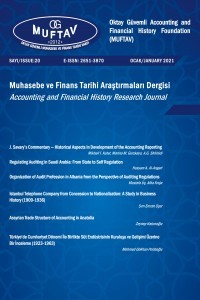Portugal, 1761: The Role of the Businessman José Francisco da Cruz (1717─1768) in the Development of Accounting(*)
The paper introduces José Francisco da Cruz (1717-1768), the first general treasurer of the Portuguese Royal Treasury (1761). A businessman from Lisbon, shareholder in the three largest monopolist trade companies of the time, this accounting technocrat made a decisive contribution for the transfer and spread of double entry bookkeeping (DEB) in eighteenth century Portugal. The article is intended as a study that explores which social and political agents were involved in the emergence and development of DEB in Portugal. The main contribution of the paper has to do with the systematisation of José Francisco da Cruz’s biographic features and professional traces as an attempt to place on Portuguese accounting history research agenda the study of individuals who were instrumental in initiating the process of accounting’s social recognition. The paper examines José Francisco da Cruz’s profile, his career and his relations with Portugal’s Chief Minister. More particularly, we outline the role of José Francisco da Cruz in the development and application of DEB in the Portuguese context: on the one hand, due to his managerial positions in the Royal Treasury and in two monopolist overseas trading companies concerning Colonial Brazil, Company of Grão-Pará and Maranhão and Company of Pernambuco and Paraíba, organizations where DEB was compulsory by means of their statutes; and, on the other hand, due to his political contribution for the establishment of the Portuguese School of Commerce (1759) as Provedor [President] of the Board of Trade.
Keywords:
Portugal, Eighteenth Century, Double Entry Bookkeeping José Francisco da Cruz, Portuguese Royal Treasury,
- ISSN: 2146-4928
- Yayın Aralığı: Yılda 2 Sayı
- Başlangıç: 2011
- Yayıncı: Oktay Güvemli Muhasebe ve Finans Tarihi Vakfı (MUFTAV)
Sayıdaki Diğer Makaleler
Ticaret Meslek Liselerindeki Muhasebe Eğitiminin Tarihi Gelişimi
Alan SANGSTER, Ellie Franklin, Dee Alwis, Jo Abdul-Rahim, Greg STONER
Muhasebe Teori ve Uygulamalarından Beklentiler
Türk Ticaret Kanunlarının Türk Muhasebe Düşüncesinin Gelişmesindeki Etkileri
Oktay GÜVEMLİ, Batuhan GÜVEMLİ
Manas Destanı’nda İktisadi Hayat ve Muhasebe Bulguları
Temin Edilebilecek Muhasebe, Finansman ve Muhasebe Tarihi Kitapları
